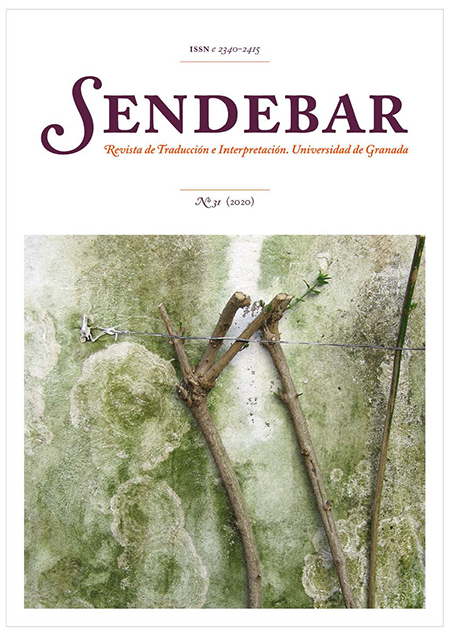Political Translation in China: Study of the Castilian Version of The Governance of China by Xi Jinping
DOI:
https://doi.org/10.30827/sendebar.v31i0.13502Keywords:
Political translation, Modern China, Xi Jinping, The Governance of ChinaAbstract
This article focuses on the features of translation in the political field. The history of translation of political texts in modern China is divided into three stages. Some macrological and micrological aspects of the Spanish version of the book The Governance of China by Xi Jinping are analysed. As for the macro analysis of this political text, we focus on the characteristics of institutional translation in China. In the micro analysis, we pay particular attention to different levels, from textuality, rhetoric and sentence structures to certain elements of the lexicon. With an indisciplinary methodology drawing both on Translation Studies and Political Theory, we will reach conclusions on the forms of political action, the characteristics of the three stages identified and the strategies used in the translation of the book.
Downloads
References
Álvarez, Román y Vidal Claramonte, M. Carmen África (eds.) (1996). Translation, power, subversion. Clevedon-Filadelfia-Adelaida: Multilingual Matters.
Bastin, Georges (2003). Por una historia de la traducción en Hispanoamérica. Íkala, revista de lenguaje y cultura 8 (14), 193-217.
Carbonell Cortés, Ovidi (1997). Traducir al otro. Traducción, exotismo, poscolonialismo. Cuenca: Ediciones de la Universidad de Castilla-La Mancha.
Chen, Shuangshuang (2019). Estudio sobre las características de la traducción de literatura central. Jounal of Zhongzhou University, 69-74.
Cheyfitz, Eric and Harmon, Alex (2018). Translation and Colonialism. En The Routledge Handbook of Translation and Politics. Fernández, Fruela y Evans, Fruela (eds.), 270-286. London-New York: Routledge.
Evans, Jonathan and Fernández, Fruela (2018). Emancipation, Secret Histories, and the Language of Hegemony. En The Routledge Handbook of Translation and Politics. Fernández, Fruela y Evans, Fruela (eds.), 1-14. London-New York: Routledge.
Fernández, Fruela and Evans, Jonathan (2018). The Routledge Handbook of Translation and Politics. London/New York: Routledge.
Gao, Shiliang (1992). Recopilación de la historia de educación en la China moderna. Shanghái: Editorial de Educación de Shanghái.
Gentzler, Edwin (2002). Translation, Poststructuralism, and Power. En Translation and Power. Tymoczko, María and Gentzler, Edwin (eds.), 195-218. Amherst-Boston: University of Massachusetts Press.
Gu, Weixing (2004). Estudio sobre la historia de la enseñanza de inglés en el Colegio de Lenguas Extranjeras. Lenguas Extranjeras y la Enseñanza 2004 (5), 23-27.
Halliday, M.A.K. and Hasan, Ruqaiya (1976). Cohesion in English. London: Longman Group.
Hurtado Albir, Amparo (2007). Traducción y traductología: introducción a la traductología. Madrid: Ediciones Cátedra.
Koskinen, Kaisa (2000). Beyond ambivalence. Postmodernity and the ethics of translation. Tampere: University of Tampere.
Koskinen, Kaisa (2008). Translating institutions. An ethnographic study of EU translation. Manchester: St. Jerome Publishing.
Lao Zi. 道德经(2015). 北京:中华书局. (Lao Zi (2015). Gran Libro del Tao (Tao te king). Beijing: Compañía Editorial Zhonghua.)
Lefevere, André (1997). Traducción, reescritura y manipulación del canon literario, Román Álvarez y África Vidal (trads.). Salamanca: Ediciones Almar.
Llorente Maldonado, Antonio (1977). Las construcciones de carácter impersonal en español. Estudios ofrecidos a Emilio Alarcos Llorach, 107-126.
Martín Ruano, María Rosario (2018). Traducción Institucional e Identidad(es): Asimetría, Conflictos, Posibilidades. En Ensayos sobre traducción jurídica e institucional. Jesús Baigorri Jalón e Icíar Alonso (eds.), 45-68. Granada: Comares.
Mossop, Brian (1990). Translating institutions and “idiomatic” translation. Meta 35 (2), 342-355.
Pereda, Carlos (2000). Sobre la retórica. Series Filosóficas 12(2), 607-626.
Pujante, David (2003). Manual de retórica. Madrid: Castalia.
Rancière, Jacques (2004). Aux bords du politique. Paris: Gallimard.
Said, Edward W. ([1978] 2008). Orientalismo, María Luisa Fuentes (trad.). Barcelona: Debolsillo.
Sanmartín, Julia (2000). Creación léxica I: Neologismos semánticos: las metáforas de cada día. En ¿Cómo se comenta un texto coloquial? Briz Gómez, Antonio y Grupo (eds.), 125-142. Barcelona: Ariel Lingüística.
Song, Yuanling, Yu, Qiang, Luo, Ying y Li, Wenlian (2018). Cuarenta años de reforma y apertura y el desarrollo de la traducción de documentos políticos. Foreign Theoretical Trends, 116-121.
Toury, Gideon (1980). In search of a theory of translation. Tel Aviv : Porter Institute for Poetics and Semiotics.
Tymoczko, María and Gentzler, Edwin (eds.) (2002). Translation and Power. Amherst-Boston: University of Massachusetts Press.
Wang, Ning (2018). Translation and Revolution in Twentieth-Century China. En The Routledge Handbook of Translation and Politics. Fernández, Fruela y Evans, Fruela (eds.), 467-479. London-New York: Routledge.
Xi, Jinping (2014). Xi Jinping La Gobernación y Administración de China. [Kindle Versión]. 北京: Ediciones en Lenguas Extranjeras.
Xi, Jinping. 习近平谈治国理政(2014). Kindle电子书. 北京: 外文出版社. (Xi Jinping (2014). Xi Jinping La Gobernación y Administración de China. [Kindle Versión]. Beijing: Ediciones en Lenguas Extranjeras.)
Zhou, Zhipei (2003). La comparación sino-inglesa y la transformación en la traducción. Shanghái: Editorial de Medio Universidad China de Ciencia y Tecnología.
Recursos electrónicos consultados
Buró de Transporte de Dalian. <http://jt.dl.gov.cn/NewsDetail.aspx?ID=b7cdfd53-d3db-4818-a323-5806634e31f8> [Consulta: 2 junio 2020]
China National Radio. <http://military.cnr.cn/jsls/jsjm/201408/t20140813_516204397.html> [Consulta: 2 junio 2020]
Ediciones en Lenguas Extranjeras. < http://www.flp.com.cn/main/newsdetail.cfm?iCntno=48> [Consulta: 2 junio 2020]
Noticias del Partido Comunista de China. <http://theory.people.com.cn/n1/2018/1224/c40531-30483788.html>[Consulta: 15 junio 2020]
Pueblo en Línea. <http://spanish.peopledaily.com.cn/n3/2017/1017/c31621-9280910.html>[Consulta: 2 junio 2020]
<http://world.people.com.cn/n1/2018/1128/c1002-30428598.html> [Consulta: 5 junio 2020]
Qiushi. Órgano del Comité Central del Partido Comunista de China. <http://www.qstheory.cn/dukan/qs/2019-11/01/c_1125178861.htm> [Consulta: 10 junio 2020]
<http://www.qstheory.cn/dukan/qs/2018-02/15/c_1122400446.htm>[Consulta: 10 junio 2020]
Translators Association of China. <http://www.tac-online.org.cn/index.php?m=content&c=index&a=show&catid=395&id=3264> [Consulta: 4 enero 2020].
WorldCat.org: The World’s Largest Library Catalog. <https://www.worldcat.org/search?q=au%3Amao+zedong&dblist=638&fq=ln%3Aspa+%3E+ap%3A%22mao%2C+zedong%22&qt=facet_ap%3A> [Consulta: 15 diciembre 2019].
<https://www.worldcat.org/search?q=au%3AXi+Jinping&fq=ln%3Aspa& qt=advanced&dblist=638> [Consulta: 15 diciembre 2019].
Xinhuanet. < http://www.xinhuanet.com/mrdx/2017-11/28/c_136784135.htm > [Consulta: 6 junio 2020]
Xinhuanet. < http://www.xinhuanet.com/world/2018-11/24/c_1123762768.htm > [Consulta: 2 junio 2020]
Downloads
Published
How to Cite
Issue
Section
License
Terminos de Licencia Sendebar.

















